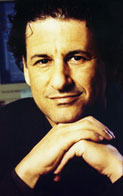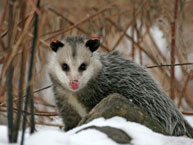Squat squirrels, cardiac kids and a New York state of mind
Squat squirrels, cardiac kids and a New York state of mind McGill University
User Tools (skip):
Headliners
Squat squirrels, cardiac kids and a New York state of mind
If you can make it there...

Levitin on why we compose and play.
Arsenio Coroa
The New York Times has taken a special interest in McGillians of late. A recent Sunday Times featured a section-front spread on music prof Daniel Levitin and his work on the connection between music — how it is composed, performed and listened to — and our brains. The Arts & Leisure section lead article traced Levitin's transformation from a college-dropout-turned-record-producer to a record-industry-honcho-turned-neuroscientist and McGill-University-professor. In his recent book, This is Your Brain on Music, the former producer for Chris Isaak and Blue Öyster Cult proposes, among other things, that man originally developed music as a way to demonstrate virility.
Next up, McGill Chancellor and World Anti-Doping Agency chairman Richard Pound was profiled in the New York Times Magazine. The lengthy Jan. 7 article called Pound a "global evangelist for the cause of pure sport," noting that in his ongoing war against cheaters, the sharp-tongued lawyer, and "one-man truth squad," is decidedly un-Canadian in his abrasive approach.

Pound protects fair play.
Nicolas Morin
Finally, the "Gray Lady" covered a study spearheaded by medicine professor Ariane Marelli that demonstrates how severe congenital heart disease is on the rise among North American adults. Before you switch to an all-wheat germ and tuber diet, it should be noted that Marelli believes that the dramatic increase of 85 percent between 1985 and 2000 is more good news than bad. "We think the most likely reasons [for the increase] are that advances in care of pediatric heart patients have allowed these infants to survive into adulthood," she explained.
Warm weather triggers animal anarchy

'possums come North to play.
iStock photo
Humongous squirrels that won't stop eating, migratory birds that sit tight and opossum sightings in Southern Quebec — all are harbingers of a winter that just won't act like winter. And while many animals are thriving in the surprisingly temperate conditions, wildlife biologist David Bird warned Montreal Gazette readers that a sudden cold snap could spring an "environmental trap" that would spell serious trouble for any lollygagging birds not suited for frigid temperatures.
"I play a doctor on TV..."
Although not as dramatic as House or ER, the upcoming Mini-Med series on Canal Savoir promises to be infinitely more informative. Having packaged the popular lecture series into seven 60-minute episodes, the Quebec cable TV station will give viewers insight into how doctors approach clinical problems.
Each broadcast will feature a prominent McGill medical specialist expounding upon such topics as cardiology, neurology and palliative care. Next, Mini-Law goes off-Broadway?

